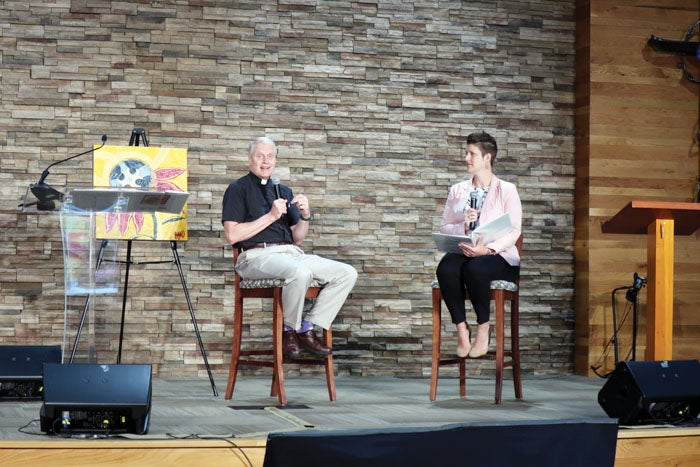Q&A with Bishop Tim Smith
Published 12:00 am Sunday, June 20, 2021

- Bishop Tim Smith answers questions from Rev. Jasmine Tesdahl. Submitted photo
By Susan Shinn Turner
For the Salisbury Post
On the final day of the Lutheran synod assembly earlier this month, Bishop Tim Smith participated in a “Hot Seat” Q&A with the Rev. Jasmine Tesdahl of Holy Trinity Lutheran Church. She was also chair of the bishop election committee. The questions were meant for the finalists for bishop, but Smith two days before was re-elected on the first vote.
“I have not seen these questions,” Smith quipped beforehand. “This will be interesting.”
Answers have been edited for brevity.
Jasmine Tesdahl: What does your commitment to anti-racism look like on a daily basis and how will you continue to lead mostly white churches?
Tim Smith: I have more work to do with my own privilege. There’s a lot of personal confession and discovery that’s been a part of my own journey. I’ve done a lot of reading in the past couple of years about books on racism. I joined the Racial Justice Network as a member. I’m working on my personal language and the things we say that are racist that we don’t even know. It’s a thin line between the personal and professional. Do I go to Elizabeth City because I’m bishop, or do I go because I’m Tim? The answer is yes.
JT: What is the number-one way you will challenge churches to support underutilized members?
TS: Given the nature of our congregations, we don’t really have a clergy shortage. We have ordinands who are eager to receive a call (LGBTQIA+, persons of color, women in ministry). There are all kinds of -isms in the synod. We need to do encouragement and modeling. When I came on staff, we were all white and straight. So it’s not just one thing. It’s just an ongoing commitment and awareness I need you to challenge me on. Sometimes I wish I were Methodist, so I could just appoint people.
JT: What does congregational vitality look like to you?
TS: It is one of our big guiding principles, and it has nothing to do with the size of a congregation. We’re living the Gospel. A lot of that is encouragement and accompaniment from a synodical perspective.
JT: How do you build relationships? How do you lead and partner with people who are different from you?
TS: I take my cue from a lot of people on my staff. You start with small steps, and it’s about intentionality to say, “Let’s talk about this.” I have a lot of listening to do, a lot of showing up to do.
JT: What Bible story has had the most influence on your daily life lately, and why?
TS: I have been thinking about the verse Romans 8:28 (We know that all things work together for good for those who love God, who are called according to his purpose.)
I am energized by the things going on in this synod. Right now I am better than 60/40. It’s a lot of good. I have been disappointed in churches and church leaders who behave badly and it does happen. But I have to give that to God. God’s got this. God’s got me. God’s got this church.
JT: How do you respond to the statement, “My bishop is too political”?
TS: We’re all political, all the time. We are in a synod assembly that is political. We’ve had elections. If someone would mention that to me, it would be a long discussion. There’s not a world where political relationships do not exist, including a pulpit.
JT: How have you worked with diverse congregations in the last six years, and how will you in the next six?
TS: Although I came from a large metro congregation in Atlanta, I have an affinity for small congregations. The bishop cannot close congregations. They vote to close themselves. Again, showing up to work with these congregations is a huge deal. I’ve never been accused of being lazy. Maybe crazy, but not lazy. We try to show up with all our congregations — small, medium, large, left, right.
JT: What do you think is the biggest challenge in moving the body of Christ together in such a politically charged climate, and how will you move us toward unity in the next six years?
TS: When I served at Grace, Boone, every time we tried to get slick, for the most part, it didn’t work. What people needed was spiritual depth and development and nurturing of faith. Preach the Gospel as faithfully as you can. Be fair with your people and love all your people and model how we can live together despite our differences. We’ve got to keep the main thing the main thing, and adopt our religious views to a set of politics, and not the other way around.
JT: What are we doing well as a synod? What could we be doing better?
TS: We’ve learned things from the pandemic in using technology to reach out to our congregations and beyond. Our mission support is steady. Our people are generous. In the big picture, people are giving, people are sharing. We have the best synod staff in the ELCA. I’m so blessed to be surrounded by great people. We’ve formed a Racial Justice Network. I am proud of this synod in a lot of ways.
Any organization’s biggest challenge is communications. Communications is not just putting out information. It’s someone looking at it and sharing.
(Synod Vice President) Diana Haywood says North Carolina is the place to be. It is.
JT: Any final thoughts?
TS: Thank you for the confidence you put in me, and in the office of the bishop. There is no synod without congregations.



